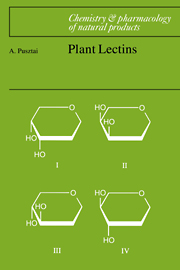Summary
It is just over a hundred years ago that the first plant lectin was described by Stillmark (Stillmark, 1888, 1889). Working with extracts from castor bean (Ricinus communis) he obtained a preparation which agglutinated red blood cells. As more and more of such substances were later discovered in other plants, and as a common name for them, the term, haemagglutinin, was proposed by Elfstrand (1898). The striking toxicity of some of the haemagglutinins, such as ricin and abrin (Abrus precatorius) has made the effects of these substances relatively easy to test on animals. Ehrlich, who is usually considered to be the father of immunology, has shownthat rabbits fed with small amounts of seeds containing the toxin became partially immune to the toxicity, thus demonstrating that the haemagglutinins were also antigenic. Landsteiner and Raubitschek (1908) showed later that not all haemagglutinins need necessarily be as toxic as ricin or abrin. For example, the agglutinins obtained from common beans (Phaseolus vulgaris), peas (Pisum sativum), lentils (Lens culinaris), etc, were relatively non-toxic, water soluble proteins. It is now known that such haemagglutinating proteins are found in all taxonomic groups of the Plant Kingdom and that they are not all overtly toxic.
The next momentous step in the history of haemagglutinins was the realization that some of the haemagglutinins agglutinated blood cells only from some groups of individuals within the ABO blood group system, without affecting cells from other groups (Renkonnen, 1948; Boyd & Reguera, 1949).
- Type
- Chapter
- Information
- Plant Lectins , pp. 1 - 2Publisher: Cambridge University PressPrint publication year: 1992
- 1
- Cited by

